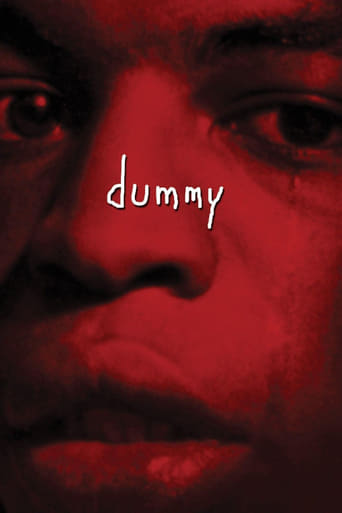

What a waste of my time!!!
... View MoreGreat story, amazing characters, superb action, enthralling cinematography. Yes, this is something I am glad I spent money on.
... View MoreIt's a good bad... and worth a popcorn matinée. While it's easy to lament what could have been...
... View MoreThrough painfully honest and emotional moments, the movie becomes irresistibly relatable
... View MoreYour found by authorities with blood on your hands and accused of murder. Your apprehended and thrown in locked cell. You don't know what the commotion is about and to make matters worse your deaf and mute, you can't communicate with anyone. This is the tragic story of the life and troubled times of Donald Lang. A deaf loading dock worker from Chicago who frequented neighborhood bars and dens of iniquity with his earnings. One faithful night Donald walked off with a prostitute. Moments Later Donald was found by police in an alley over the dead prostitute's body. A deaf mute but not like most with his misfortune. Donald was born deaf and at the critical age of six was about to embark on a school for the deaf to learn how to sign, lip reading, read and write to communicate with the outside world.Due to untimely circumstances, Donald's parents split up and with financial burdens were unable to send the boy to the deaf school rendering him illiterate,irresponsible and over protective leaving him unprepared in life and in this case murder. Unable to stand trial because of an earlier supreme court decision that a defendant must understand the charges against him and have the ability to aid his attorney in his own defense, poor Donald lacked the skills to even form a simple sentence. Enter Deaf Attorney from the State of Illinois, Lowell Myers An extraordinary individual highly educated with numerous credentials. A Masters in Business Administration, B.A in accounting, C.P.A. and a Law Degree.Mr. Myers being a tax attorney and CPA was a ground breaking advocate for the hearing impaired in the State of Illinois. Getting legislation passed for the deaf in fraudulent business contracts and phony real estates deals manifesting into law that an interpreter be present when signing any contract involving a deaf person. Also Myers lobbied for the Deaf to obtain Drivers licence in the State of Illinois emphasizing that a deaf driver has a deeper concentration at the wheel and does not get distracted. With Donald Lang in Jail, Lowell Myers fought for his right for due process. It took a few years but a trial was finally held. This challenging made-for-TV movie gives us an unprecedented look at a person who can't fend for himself. LeVar Burton as the frustrated Lang, makes great use of pantomime throughout with his physical gestures borrowed from his role as the captured slave Kunta Kinte in the famous "Roots" series. Personally I feel that this was Paul Sorvino's finest role and I've seen quite a bit of his work. The concentration of his fractured speech emulates a deaf person's voice perfectly and consistently through out the movie. Brian Dennehy as Lang's boss does a fine job in a supporting role. I watched and most importantly learned about two separate individuals both branded with deafness. Guilty or innocent? I learned a great deal from this movie. Other movies like Amistad and Johnny Belinda also feature court scenes with persons who could not defend themselves due to hearing loss or language barriers.
... View MoreI saw this movie at a very young age and was very moved. I never saw anything hostile about Donny. Sure, it was just a movie, but no one that he encountered, even white, detected any mean streak. While I have deep sympathy for both Earline and Ernestine's family's, If you have not lived the criminal LIFE, such as prostitution you don't exactly know what these women were willing to do to get money. Then, you have someone that cannot communicate at all, other than to indicate what I am willing to pay you and what I want from you. If, perhaps they were not accepting of what was being offered, and demanded more than could be understood, he very well could be a murderer. But, that was the life they chose, for whatever reason. It's like trying to communicate to a child or an animal. DON'T YOU UNDERSTAND!!! His communication skills were very limited..... Very limited........ The problem may have been that his family denied teaching him skills. MAYBE, he didn't even know that killing is wrong....Black or White and deaf & dumb, what more could society do????????
... View MoreObituary for Lowell Jack MyersLowell J. Myers, 76: Deaf Lawyer and Advocate for Deaf PeopleLowell J. Myers, who lost his hearing at a young age but found in himself a strong, unwavering voice as a champion for the deaf , the bullied and the underdog, even arguing 17 cases before the Illinois Supreme Court, died Nov. 7, 2006 of a brain aneurysm. He was 76.Mr. Myers was born in Los Angeles in 1930 to deaf parents and educated in Chicago. He had some hearing until age 10, when he, too, became deaf. That setback, and the adversity faced by his deaf parents, fueled a two-fisted determination to succeed, that resulted in him attending both Roosevelt University (BA) and the University of Chicago (MA) at the same time in order to receive his education.After graduating with college degrees from two universities simultaneously, he applied to the John Marshall Law School in Chicago. But the dean refused to admit him, saying he feared Mr. Myers, as a deaf person, would not be able to keep up, much less graduate. Were Mr. Myers able to do so, the dean suggested, he would not be able to pass the Illinois Bar Exam, or, if that obstacle was overcome, to practice law in a courtroom.The dean relented to allow Mr. Myers to attend the law school for one semester - as a trial period. In a foreshadowing of what was to come, Mr. Myers did well at this trial; he went on to graduate second in his class of 80 students, the first deaf student to graduate from the school and one of the first to graduate from law school in the country.Mr. Myers was also a CPA and worked in the tax law department with Sears, Roebuck & Co. for 30 years, but it was his compassionate work outside of this arena that earned him acclaim.In his most famous case, he defended a deaf man accused of murder who did not know sign language and could not communicate with anyone. A book about the case, Dummy, was published by the "Book of the Month Club," selling more than 100,000 copies. It was later turned into a TV movie, starring actor LeVar Burton as the deaf defendant.But it was not only deaf and hard of hearing people that Mr. Myers became an advocate for. He also viewed himself as a voice of reason in defense of those he felt were being bullied or taken advantage of. He successfully sued the Chicago Police Department for the shootings of deaf people, and his efforts resulted in the department instituting training to help officers more effectively work with the deaf.He argued cases before the Illinois Supreme Court 17 times - and never lost! In one of those cases, he represented a group of taxpayers who had been overcharged by the government, and his pleas were so impassioned and his work so extensive in the case, the justices later awarded him legal fees of $90,000, nine times the $10,000 fee he requested.Mr. Myers used his influence as a legal advocate for the deaf community to write laws to help deaf people that are still being used throughout the United States. His book, The Law and the Deaf, also became a model used by others in foreign countries. A second book detailed how to handle legal cases of police brutality. He also wrote and self-published a student version of The Law and the Deaf that was widely used in high schools for the deaf. The Illinois State Bar Association honored him in 2006 as a "Senior Counselor" for 50 years of service to the profession.Recently, Mr. Myers moved from Chicago to Washington, D.C. to be closer to his daughter, Lynda Rae Myers, a deaf social worker, and his grand-daughter, Ariana Myers (deaf), of Takoma Park, MD. In addition to them, he is also survived by his son, Nathan Benjamin Myers of Chicago, who followed his father into law; and two sisters, Jean Markin and Dorothy Doyle of Santa Fe, New Mexico.
... View MoreI remember watching this film twice as a kid, I haven't seen it since. Ernest Tidyman wrote the screenplay for it (he is the same guy who wrote The French Connection). LeVar Burton made his debut as Kunta Kinte in Roots (what a great way to start your career). He said at the time that this was the most challenging role imaginable, playing a deaf and dumb young man accused of murder. Donald Lang is a 20 year old who lives with his siblings and works on the loading docks, he is charged with murdering a prostitue. Lowell Myers is a deaf lawyer who takes on his case. Paul Sorvino is an excellent actor who always delivers and he takes on this challenging role as well. This movie makes it out like there is evidence that Donald Lang was innocent and didn't kill the hooker Ernestine Myers. A woman tells his lawyer that she heard Myers having an argument in the alley where she was murdered with another man and she heard his voice! Lang is taken back to the alley where she was killed and "acts out" a scene where he fights with another man who was the real killer. Sorvino makes an excellent speech at the conclusion where he talks about how a deaf mute is still entitled to the same rights as everyone else. He points out how Charlie Chaplin could make an audience laugh and cry and not use one single word. Its a great speech that tugs at your heartstrings its true, but folks I need to point out something. Every time Hollywood makes a film about a real life murder case, they always make it out like the criminal in question was INNOCENT! Why in the hell do they do this? Is Hollywood full of bleeding heart liberals who pee their pants every time someone is accused of a crime and God forbid if they are poor or African American! Evil comes in all colors and Donald Lang was evil and he was GUILTY! Five years after the murder of Ernestine Myers he was released from the asylum. Shortly afterwards, there was another woman who was murdered and he was seen leaving a bar with her. This time, there was overwhelming physical evidence that Lang was the killer and he was sent to prison for the rest of his life. If our legal system worked the way it should, this woman needn't have died. Donald Lang really was a killer and no amount of moralizing by Hollywood can change that cold hard fact. This film sort of reminded me of The Hurricane about Rubin Carter. It is a well made film with fine actors, but at the same time you have to take it with a grain of salt folks because the murdering son of a bitch really did it! CASE CLOSED!!!!!
... View More